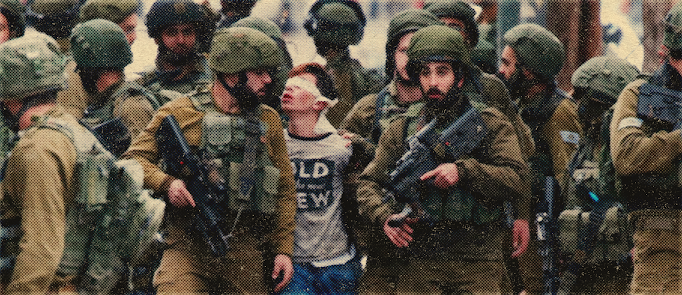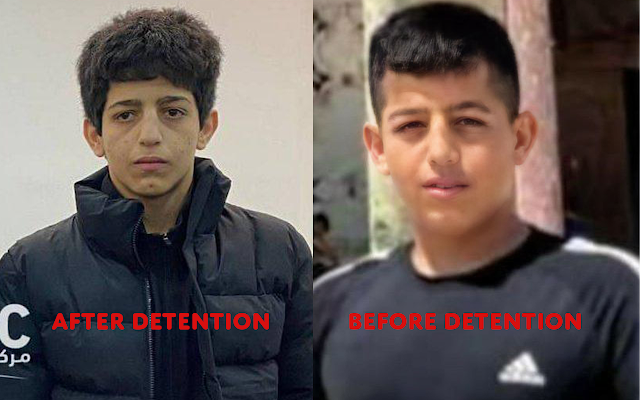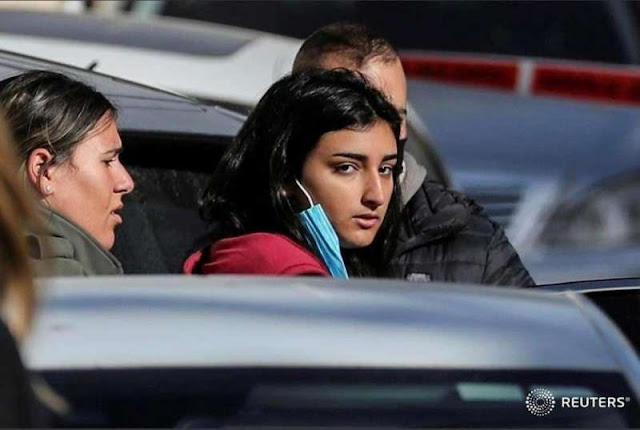Since November 24th, a truce brokered by Qatar and Egypt, with support from the U.S., has been held between the Palestinian factions led by Hamas and Israel. Tuesday marked the fifth day of the ongoing truce, subject to potential extensions.
While Cairo, Doha, Washington, and Gaza advocate for a ceasefire, Tel Aviv faces internal divisions. The current Israeli cabinet is at risk of collapsing as its right-wing ministers oppose any truce or exchange of captives, aiming for the continuation of aggressive colonial racist policies toward Palestinians.
 |
| From the archives: The arrest of 16-years-old Palestinian Fawzy Al-Junaidi in occupied West Bank in December 2017 by Israeli forces |
The Israeli army itself exhibits internal divisions, driven by the fear that a peaceful completion of a Palestinian detainees-Israeli captives exchange deal would signify another defeat for Israel.
Once again, Israel’s invincible army will be defeated by a militant group whose members wearing knock-off Adidas pants and slippers instead of boots in Gaza. That defeat would impact the image of the Israeli army in the region.
Until Tuesday, 60 Israeli captives, including women and children, have been released from Gaza in exchange for the release of 180 Palestinian detainees, mainly women and children, from Israel. Additionally, 21 captives, comprising 19 Thais, one Filipino, and one Russian-Israeli man, were released in separate deals.
Notably, Israel initially excluded Thais and Filipino workers from its negotiations, leading both the Philippines and Thailand to involve their Ministers of Foreign Affairs in discussions in Doha and Cairo.
Under ideal circumstances, no child, elderly person, woman, or unarmed individual should be taken captive or held hostage.
Following the truce deal announcement, the Israeli government has already published a list of 300 Palestinian detainees online.
However, examining the disproportionate numbers of Palestinians, particularly children and women, unjustly detained in Israeli prisons and the harsh conditions they endure, one might comprehend the motives behind such actions.
It was a desperate action to release those detainees or rather hostages as they have been called by the Egyptian Foreign Minister Sameh Shoukry at the UN Security Council in New York on Wednesday. Since October 7, the Israeli occupation forces arrested about 3,365 Palestinians in the West Bank.
In the Arab world, we know this technique as Israel is trying to use these new detainees in the talks to release its hostages instead of the old Palestinian detainees already in Prison.
In the past five days, Western media coverage has once again focused on one side, perpetuating the demonization of the other.
Several overlooked facts, crucial to understanding the situation, include the illegality of Israel's presence in East Jerusalem, the West Bank, Gaza, and the Golan Heights, as it constitutes an occupying force according to international laws and UN Security Council Resolutions, particularly Resolution No. 242.
UN Security Council Resolution No. 242 of 1967 mandates Israel to withdraw from East Jerusalem, the West Bank, Gaza, and the Golan Heights, returning to the borders of June 4, 1967. Consequently, the Israeli military courts and their sentences are deemed illegal and null.
When it comes to wording, they are not Palestinian teens but rather Palestinian children because Yes, according to international law, teenagers are considered children.
The Convention on the Rights of the Child, an international treaty that recognizes the human rights of children, defines a “child” as a person up to the age of 18 years. This definition is also supported by the United Nations.
Another important fact neglected, those detainees are not terrorists in a nutshell.
Investigations by Western journalists, including those from The Intercept, reveal that out of the 300 names, 233 have not been convicted of any crimes; they are merely categorized as "under arrest," also known as "administrative detention." The majority of these individuals are teenage boys, with 124 of them being under 18 years old.
Addressing the plight of Palestinian children detained in Israeli prisons necessitates an understanding of the stark facts and figures documented by Western organizations such as Save the Children. Since 2000, the Israeli military has detained and imprisoned over 12,000 Palestinian children.
Notably, from 2015 to 2022, a staggering 9,000 Palestinian children found themselves admitted to Israeli prisons. Since June 1967, it is estimated that between 500 and 1000 Palestinian children are held in Israeli military detention annually.
Disturbingly, the conditions of their detention reveal a grim reality.
A significant 81% of these children experienced physical beatings, while a staggering 86% were subjected to strip searches.
“They released dogs at us.”
— AJ+ (@ajplus) November 29, 2023
Palestinian women and children released from Israeli jails as part of the truce agreement described an escalation of starvation and beatings by Israeli guards since October 7. pic.twitter.com/MHh2zDyEBc
Shockingly, 88% did not receive adequate medical treatment for any ailments or injuries they may have sustained.
Like the case of 16-year-old Mohamed El-Nazzal from the Jenin refugee camp in the West Bank, who was released on Monday, a disturbing narrative unfolds.
El-Nazzal arrested three and a half months ago, disclosed that a week prior, guards at the Negev Desert Israeli jail physically assaulted him and his cellmates following the death—or alleged murder—of another inmate.
This Palestinian teenager says Israeli prison officers beat him and then refused to let him have medical treatment. Mohammed Nazzal spoke to Al Jazeera after he was released. pic.twitter.com/NNP6HW1bLz
— AJ+ (@ajplus) November 30, 2023
The deceased cellmate Thaer Abu Asab, as reported by another released detainee, was allegedly beaten to death by Israeli guards after daring to inquire about the truce.
شهادة أحد الأسرى المحررين تكشف تفاصيل استشهاد الأسير ثائر أبو عصب بعد سؤاله عن #غزة#الجزيرة_مباشر #فلسطين pic.twitter.com/EI2VJL9nZE
— الجزيرة مباشر (@ajmubasher) November 27, 2023
38-years Abu-Asab was arrested in 2005. He was sentenced to 25 years in prison
In the violent incident, Nazzal suffered a broken arm and fingers, and his back was stomped on. Shockingly, the guards offered no medical assistance, nor did they transfer him to the prison clinic for treatment.
Only upon confirming his release in the truce on Monday did Nazzal receive proper medical care upon leaving the jail, with the Red Cross attending to his injuries.
To discredit Nazzal, the Israeli government utilized its social media accounts and Twitter trolls, releasing a video showing him without a cast on his arms and walking in what they considered a normal manner.
However, this effort to discredit Mohamed Nazzal proved unsuccessful, as the Palestinian Health Ministry subsequently published the official results of his medical check-up, along with X-rays that substantiated his allegations.
 |
| Mohamed Nazzal's medical check-up proved that he was beaten at the Israeli prison unlike what the Israeli official accounts claimed. |
The medical records and X-rays served as evidence, refuting attempts to undermine El-Nazzal's account of the physical abuse he endured in Israeli custody.
Traces of torture on the body of the Released teenager Mohammad Nazzal, who was a prisoner in Israeli jails, and set free as part of the exchange deal between the Palestinian resistance and the Israeli occupation. pic.twitter.com/2W8tRSQicV
— Shatha Hanaysha (@ShazaAbed) November 30, 2023
Sixty percent of the detained Palestinian children endured solitary confinement, with the duration ranging from one day to an alarming 48 days.
These children faced deprivation of basic services, with 70% reporting hunger and 68% stating they did not receive any healthcare during their detention.
By observing the images of recently released child detainee Kassem Atwan before and after his time in detention, it becomes evident that Palestinian detainees, particularly children, aren't merely enduring physical suffering inside Israeli prisons; instead, they are profoundly affected and broken from within.
 |
| Kassam Atwan before and after the detention in Israeli prisons |
Additionally, 58% of the detained Palestinian children were denied visits or communication with their families while in detention.
The astonishment on Kassem Atwan's father's face upon seeing his son so frail for the first time indicates that these young detainees likely did not receive family visits.
Concerned, he inquired if his son had been adequately fed in prison.
"وين وزنك راح؟ ما بطعموكم؟
— ق.ض 𓂆 (@jalestinian) November 28, 2023
-لا، حرمونا كل شيئ"
- لحظة وصول الطفل المحرر قسام عطون لمنزله، حيث بدت عليه علامات الإعياء والهزل نتيجة سياسة التجويع ضد الأسرى داخل السجون. pic.twitter.com/JkR9ybDNaw
The boy, with one of the most sorrowful expressions I've encountered, informed his father that they were deprived of everything in prison. Other Palestinian child detainees disclosed that they were occasionally given uncooked rice to eat.
The mother of Mohamed Nazzal wept in front of the camera upon seeing her son, realizing the extent of his suffering during his time away from her.
The way these children were apprehended paints a distressing picture.
During the arrest, 89% were blindfolded or hooded, and a striking 97% had their hands bound. More than half—52%—faced threats to harm their families, creating an atmosphere of fear and intimidation.
The denial of contact with lawyers affected 47% of these young detainees, undermining their right to legal representation.
Alarmingly, 59% of arrests occurred at night, further contributing to the trauma experienced by these Palestinian children.
Recently, a deeply troubling pattern has emerged within Israeli forces operating in the occupied territories: the arrest of Palestinian children, particularly when they are already injured, either by Israeli soldiers or by Zionist Jewish settlers.
One such case involves 14-year-old Abdel-Rahman El-Zaghlal, a resident of East Jerusalem’s Silwan who was released earlier this week in the exchange.
On August 23, 2023, El-Zaghlal was shot in the head by Israeli occupation forces while on his way to buy bread, resulting in a severe head injury, including a complete fracture of the left part of his skull.
Disturbing video footage surfaced, revealing El-Zaghlal being taken on a stretcher from an ambulance by Israeli forces during his transfer to the hospital.
Initially left bleeding, El-Zaghlal was subsequently moved to intensive care at Hadassah Ein Karem Hospital, where a portion of his skull bone was removed.
According to Abdel-Rahman, he was informed that he had "died" four times during the operation. Despite the severity of the situation, Israeli forces, in significant numbers, stormed the hospital, preventing his family from being by his side.
Instead of holding the responsible policemen accountable, he was transferred to Ramla Hospital prison after only two weeks, remaining in detention in critical condition for 26 days.
On September 14, the Israeli Court decided to release Abdul Rahman but imposed indefinite house arrest, necessitating his family to pay bail.
Consequently, his family had to vacate their residence in Silwan.
Abdul Rahman, part of the third batch of the prisoner exchange deal, finally had his ankle bracelet removed after the announcement. On Tuesday, he began preparations for a series of operations to address the impacts of his injuries as it turned out he could not have done them under house arrest.
Omar Abu Mayaleh, another resident of East Jerusalem's Silwan, underwent a similar ordeal eight months ago.
He was detained and subsequently released in the recent exchange. At the age of 15, Mayaleh was shot in the stomach with live ammunition by a Zionist settler in the renowned East Jerusalem district.
 |
| Omar Abu Mayaleh while in the ICU in April 2023 |
Shockingly, instead of apprehending the responsible settler, Abu Mayaleh was taken into custody directly from the hospital where he was receiving initial treatment.
Abu Mayaleh was released also this week and returned to his family.
Young prisoner Omar Abu Mayaleh from the town of Silwan in occupied Jerusalem joyfully reunites with his mother after being released as part of a deal with the Israel occupation state. #Palestine 🇵🇸 pic.twitter.com/vvkmUNhfeD
— Quds News Network (@QudsNen) November 27, 2023
The situation echoes a broader concern about the Israeli military courts, which appear to reflect a pattern seen in counterparts across the Middle East. In case you do not Palestinians in the occupied territories are detained and prosecuted according to the Israeli military law.
We are discussing children who, as civilians, find themselves facing military courts. Israeli military law already says that a child as young as 12 years old can stand trial.
In fact, children even younger than this can be detained and interrogated without lawyers like for instance Qassam and Nasrallah Al-Awar, the two cousins who have been released on Sunday from East Jerusalem’s famous Silwan.
The two boys began their journey through the Israeli detention system in East Jerusalem at the ages of 5 and 6, allegedly for throwing stones at Israeli soldiers.
Now aged 17 and 16, Qassam has been detained twice, while his cousin Nasrallah has been arrested four times.
According to the Washington D.C.-based Carnegie Endowment for International Peace Think Tank, Israel's military court system employs a broad definition of what constitutes a security offence in the occupied territories.
This expansive definition often results in the prosecution of many Palestinians in military courts, subjecting them to lengthy penalties, even for non-violent activities.
Among the security offences in question is participation in a demonstration of more than ten people without a permit, particularly if it is deemed political.
Actions such as waving Palestinian flags or participating in vigils without approval can lead to imprisonment in Israel or result in indefinite administrative detentions.
Membership in an organization that Israel designates as illegal, including the Palestine Liberation Organization (PLO), can also result in imprisonment.
Additionally, posting social media messages critical of Israeli forces and the occupation can bring individuals under the scrutiny of Israeli security, as witnessed in recent weeks for Palestinians with Israeli passports.
Arab people in Arab countries especially neighbor countries know these charges very well.
Recently there has been also an increasing rate of arrests based on the false reports and complaints of the Jewish Zionist settlers in areas like Silwan or Sheikh Jarrah in East Jerusalem.
Like in the case of 16-year-old Nufuz Hamad, the youngest Palestinian girl to be released earlier this week from Israeli prison.
 |
| Nufuz during her arrest Photo : Reuters |
Nufuz was arrested at the age of 14 after the settlers who took over the house next to the Hamads accused her of attempting to murder one of them.
According to her lawyers, Nufuz should have been released earlier during the truce, but she was physically assaulted by Israeli guards and had to receive treatment before leaving the prison, battered.
According to the Carnegie Think Tank, the conviction rate for Palestinians processed through the Israeli military court is a staggering 99%. In stark contrast, only 3% of Israelis were accused of committing crimes against Palestinians between 2005 and 2017.
This is in addition to the black hole called “administrative detention” which in a nutshell allows the Israeli government to detain a person without trial nor having committed an offence in the first place, on the grounds that he or she may plan to break the law in the future.
According to Israeli human rights NGO B’TSelem, since March 2002 not a single month has gone by without Israel holding at least 100 Palestinians in administrative detention.
As of November 1, Israeli authorities detained almost 7,000
Palestinians from the occupied territory for alleged security offences, as
reported by the Israeli
human rights organization HaMoked.
By December 1, there were 2,873 Palestinian administrative
detainees held without trial, according to HaMoked.
Human Rights Watch notes
that significantly more Palestinians have been arrested since the October 7
attacks in Israel than those who have been released in the past week.
There will be no defeat. You Arabs crossed all red lines. This time we will fight like Muslim heroes. We will kill and destroy everything and boast about it for all eternity.
ReplyDeleteThe IDF is doing a remarkable job. They are taking out the trash as they know they must, with seriousness and resolve. I watch in admiration as much of Gaza is being reduced, day by day, to rubble. It's a necessary part of destroying the tunnels and flushing out the tunnel rats.
Delete